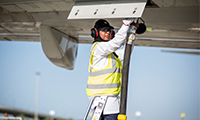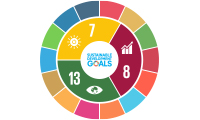Social partners
Our partners help us respond to a range of community or human rights topics and address specific priorities such as boosting local employment and improving access to energy.
We work with local and global organisations, including the Danish Institute of Human Rights, humanitarian organisations such as Mercy Corps and non-governmental organisations such as Pact, which help us understand and address the needs of the communities where we operate. With some of them, like the Clean Cooking Alliance, we build long-standing relationships that can adapt to changing priorities and benefit both sides.
Improving living standards
Our work with Pact in Myanmar aims to increase access to cleaner and reliable energy, establish local governance systems and implement savings and livelihood programmes. These efforts have helped to improve the living standards of around 35,000 people in the central dry zone and Thanintharyi Region. By September 2018, more than 8,000 households had purchased solar systems for their homes and community areas, giving around 20,000 people access to renewable energy.
Pact set up three funds with a total starting capital of around $310,000 that communities can use to help meet local development needs such as health emergencies, public infrastructure and education. Around 2,100 women in Myanmar have benefited from Pact’s micro-banking programme WORTH, which brings women and older girls together in small groups to save money, access credit and start small businesses. Around 85 WORTH savings groups have been set up so far and they manage in total about $138,000 in funds, which the women can use to finance their own businesses.
Clean cooking
With our partners from the Clean Cooking Alliance, we co-funded the launch of a campaign to educate rural populations in India about the health benefits of cleaner cooking solutions. The campaign, which focuses on Gujarat and Uttar Pradesh provinces, employs innovative communication channels and technologies, and aims to reach up to 70,000 people.
In China, Shell and the Clean Cooking Alliance have worked together to implement a market-based clean cooking programme in Liaoning, Henan, Hebei, Hubei, Sichuan, Chongqing and Gansu provinces. A new programme in Zhejiang province aims to help small businesses and households make the switch to cleaner and more efficient cookstoves and fuels.
We continue to fund the Alliance’s advisory and financial support to clean cooking enterprises around the world to unlock the commercial opportunities of this market for social entrepreneurs, whose start-up businesses focus on solving social, cultural, or environmental problems.
EXTERNAL VOICE

Dymphna van der Lans
CEO, Clean Cooking Alliance
Shell is working with the Clean Cooking Alliance to achieve universal access to clean cooking solutions by 2030, in line with the UN Sustainable Development Goals.
"We are working with partners to build an industry that makes clean cooking accessible to families around the world. Shell is one of our founding partners and has supported important Alliance initiatives to strengthen clean cooking markets in China, Ghana, India, Kenya and Nigeria. Shell has also supported the development of a new international laboratory standard for cookstove testing, a critical benchmark for countries looking to implement clean cooking policies. Through this partnership, we are supporting businesses to grow, attract private sector investment and reach women and their families everywhere with affordable, high-quality and appropriate clean cooking products."
Business mentoring
In 2018, we worked with Mercy Corps to launch the Shell MicroMentor platform, which facilitates business mentoring for entrepreneurs in Brazil, Italy, Nigeria, Pakistan, South Africa, the UK and Trinidad and Tobago. We aim to develop local business skills in the communities where we operate through volunteer support from Shell employees. Through the collaboration, around 20 entrepreneurs were supported with accounting, finance, management and human resource training.
Better access to jobs and training
In Tanzania and Kenya, we support a programme called Employment and Skills for Eastern Africa (or E4D/SOGA) in partnership with the German, British and Norwegian governments. This programme aims to improve access to jobs and economic opportunities for local people in natural resource-based industries and related sectors through supplier development, vocational skills development, matching and career guidance, and upskilling training institutions and qualifications.
By the end of 2018, 12,887 people participated in E4D/SOGA-supported training courses, of whom 40% were women. So far, 2,719 people found employment and a further 3,658 have increased their income by an average of 48.3%. In addition, 314 small- and medium-sized enterprises and 6,899 small-scale farmers were supported through E4D/SOGA’s enterprise development measures.
Human rights
We consult with international organisations, companies and civil society to understand and respond to current and emerging human rights issues relevant to our business. We have collaborated closely with the Danish Institute for Human Rights since 1999 to assess and improve our approach. In 2018, the institute provided insight into emerging human rights issues and advice on employee communications material, along with critical thinking and constructive challenge in discussions at our annual human rights meeting.
 Our people
Our people
 Sustainable development goals
Sustainable development goals
 About our data
About our data
 Electricity
Electricity